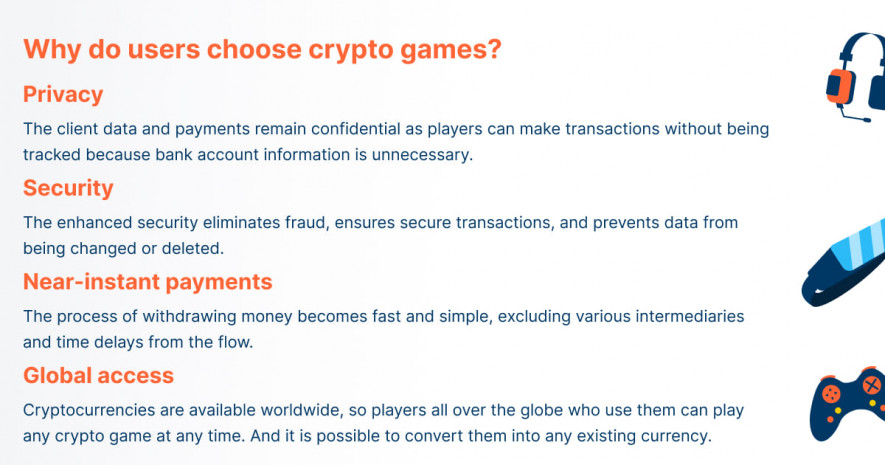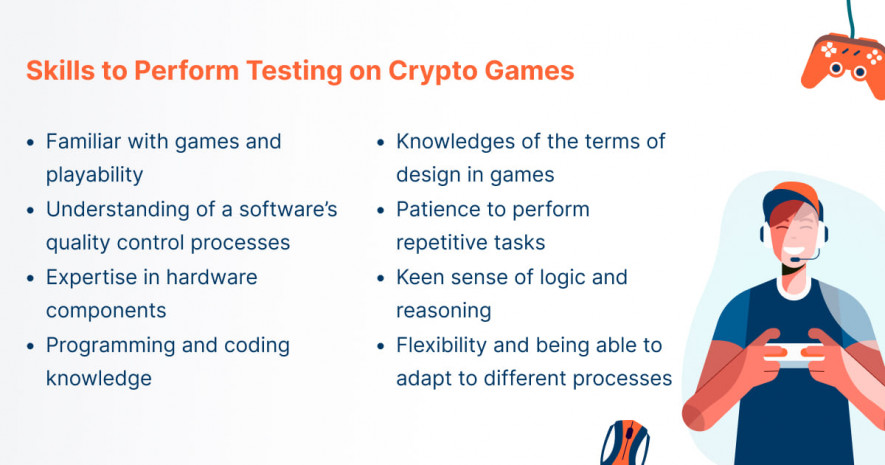How to develop a crypto game to impress the market?
by Yanina Shabanova | June 7, 2022 2:27 pm
Cryptocurrency has become a global phenomenon in recent years. Various industries are benefiting from the convenience of cryptocurrency, and one of those industries is online gaming. As per a report by the Wax[1], around 75% of online game players want to exchange their virtual assets for a currency they could use to buy and sell on other platforms.
This article will discuss crypto game development and give an overview of the steps through platform testing.
What is crypto gaming?
Traditional games are centralized, which means all items and experiences gained while playing cannot be used in other games. Crypto gaming changes this by introducing blockchain technology, decentralizing the control over information, and giving equal powers and controls to the players and creators. No one can edit data blocks controlled by a worldwide network of computers since they are immutable. As a result of enhanced protection, these blocks are now guarded by a cryptographic component and cannot be hacked. Players can use their rewards and items across different crypto gaming projects without fear of theft, tampering, or unauthorized modifications.
One of the most important things to note is that crypto games have shifted the attention away from developers and focussed it on the players. This means that all the financial benefits that were once going to the game development company can now be won by the players. It is called a play-to-earn model; players can do this in various ways. They have the ability to wager using cryptocurrencies like Bitcoin, Ethereum, and Dogecoin rather than traditional fiat currency (US dollars, Euros, Pounds Sterling, etc.).
Another distinguishing feature of such products is the use of smart contracts to block bets while playing games or processing payments. It makes the process automated and reliable.

What are the parts of crypto game development?
In launching the crypto game the development stage is generally the longest as it’s the backbone of the whole process.
Direct development work is preceded by an analytical part, where the leads prepare a technical plan, including project features, technology stack, architecture overview, and timeline.
After that, the dev team begins to work on:
Blockchain structure
Crypto game developers should understand blockchain consensus, hash functions, and distributed ledger technology. The white paper defines the infrastructure and methodology of blockchain. Furthermore, it is essential to understand different blockchains and how they work, like Ethereum, Bitcoin, Neo, and Hyperledger.
Data structures and databases
The next step is to structure the blockchain network according to the demand and requirement.
Smart contract
This element is vital, as a smart contract is a blockchain-based program responsible for the cryptocurrency movement, the cybersecurity of a game, and customization of transactions. The most crucial point is that the smart contract cannot be rewritten, so development should be careful.
Decentralization and its application in blockchain
The dApps can be built using other protocols and procedures on different blockchain platforms.
Cryptography
Digital ledger and cryptography are fundamental elements of crypto game development. Developers need to understand the different fundamentals of it as well as the algorithms which go into it. These are important to create the digital assets and resources in the game that a user can buy and sell in the marketplace.
Coding and programming
The back-end part is responsible for getting all the data, content, and architecture of a game into one whole system. It’s essential to create a structure of a decentralized game and make an application get information about the necessary data, functions, and commands not only from the game code but also from the blockchain.
Why is testing crucial in crypto games development?
Crypto games are a novel concept not only for most ordinary people but also for game developers. That’s why it’s better to pay special attention to testing in order to ensure that a game is bug-free.
There are three main stages of QA that assure a thorough check. Thus, specialists can fix bugs before listing a game on a platform.

Unit testing. It will verify the coding is performed correctly at the lowest level of the development cycle. Developers and testers can use this test to determine whether their written code is efficient and performing well for small functions. This also ensures that the bugs and errors are detected at the earliest.
Alpha testing. Once developers finish a game, testers take over with Alpha testing. Alpha testing is closed testing, which means quality checks by professional QA engineers before a game is launched on the market. This stage consists of several more functional and non-functional game test types.
Functional game testing
- Interoperability testing
- Regression testing
- Smoke testing
- Localization testing
- Security access control testing
- User acceptance testing
Non-functional game testing
- Performance testing
- Load & stress testing
- Stability testing
- Usability testing
- Compliance testing
- Configuration testing
Beta testing. Unlike Alpha, Beta testing consists of only two testing types — closed Beta and open Beta. It’s conducted not with various software and automated tests like during the Alpha testing, but with real-world people. Closed Beta testing is performed by a limited number of people who usually work in the game development industry. An open Beta tester can be a gamer or other non-professional person. In both cases, these people use a game, record the bugs they face, and deliver reports to QA engineers.
The testing phase will allow you to make sure that your crypto game is ready to launch, performs all the necessary functions, and is secure for users. Since gaming is already associated with certain user concerns, you can not afford to release an unreliable system to the market.

Conclusion
As we see, a lot of hard work is involved in developing a crypto game. Since blockchain applications are decentralized and the database is present at many places instead of one, it becomes nearly impossible to fix a bug. Therefore, our team performs testing thoroughly, because if it is not done correctly, all the hard work can quickly go in vain.
You can use these instructions as you work on your crypto game. As you may have noticed, testing blockchain[2] solutions require deep expertise. QATestLab has been providing step-by-step testing support for 15+ years. Our team will be happy to help you release a game[3] that meets the market standards and the latest trends.
Learn more from QATestLab
Related Posts:
- a report by the Wax: https://medium.com/wax-io/cryptocurrencies-are-on-track-to-dominate-online-video-gaming-and-here-are-the-numbers-that-show-cbe81dc397b0
- testing blockchain: https://blog.qatestlab.com/2020/08/04/blockchain-testing-in-2020/?utm_source=blog&utm_medium=article&utm_campaign=crypto-games-testing-08062022
- help you release a game: https://game.qatestlab.com/?utm_source=blog&utm_medium=article&utm_campaign=crypto-games-testing-08062022
- The Secret of NFT Games Popularity: Features and Benefits: https://blog.qatestlab.com/2022/07/13/nft-games-features-benefits/
- SBC Summit 2025: Automation in iGaming and Betting Niches: https://blog.qatestlab.com/2025/10/02/sbc-summit-2025-automation-in-igaming-and-betting-niches/
- Behind the Scenes at Nordic Game 2025: GameDev Trends and Interview with QATestLab’s Delegation: https://blog.qatestlab.com/2025/06/04/nordic-game-2025-gamedev-trends-and-interview-with-qatestlabs-delegation/
Source URL: https://blog.qatestlab.com/2022/06/07/crypto-games-testing/

